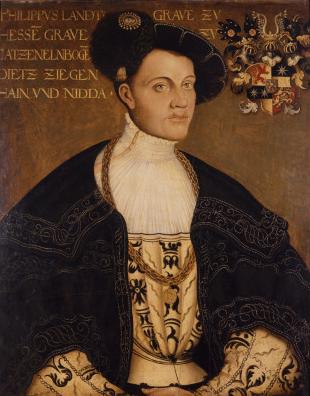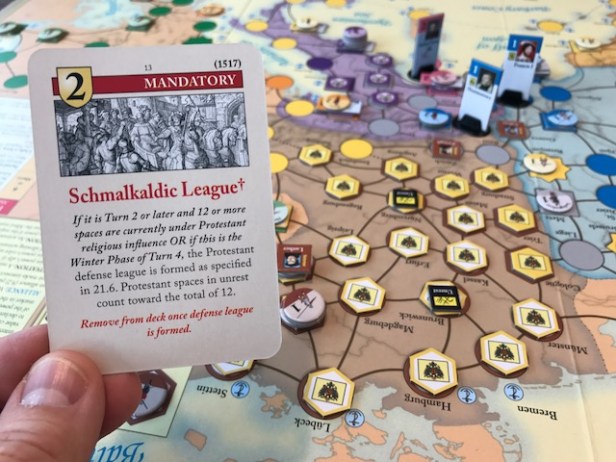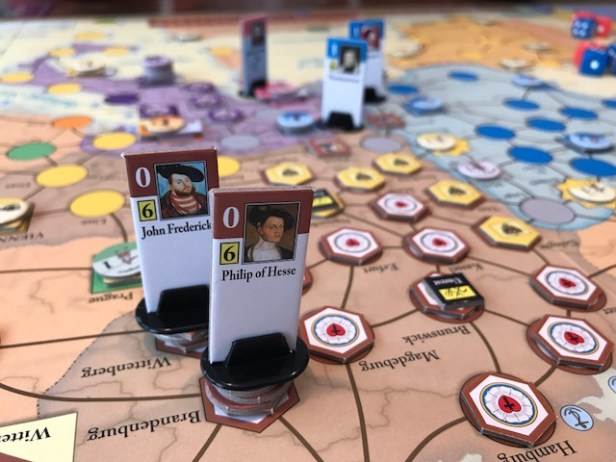In our final Action Point for Here I Stand: Wars of the Reformation from GMT Games, we will take a look at the mandatory Event Card Schmalkaldic League and how it changes the game from a wholly religious struggle between the Catholics and Protestants to a little bit of action.
 The Schmalkaldic League was a defensive military alliance of Lutheran princes within the Holy Roman Empire during the mid-16th century. Although originally started for religious motives soon after the start of the Reformation, its members eventually intended for the League to replace the Holy Roman Empire as their source of political allegiance. While it was not the first alliance of its kind, unlike previous formations, such as the League of Torgau, the Schmalkaldic League had a substantial military to defend its political and religious interests. It received its name from the town of Schmalkalden, which is located in modern Thuringia. Its instigators and founders were by Philip I, Landgrave of Hesse, and John Frederick I, Elector of Saxony.
The Schmalkaldic League was a defensive military alliance of Lutheran princes within the Holy Roman Empire during the mid-16th century. Although originally started for religious motives soon after the start of the Reformation, its members eventually intended for the League to replace the Holy Roman Empire as their source of political allegiance. While it was not the first alliance of its kind, unlike previous formations, such as the League of Torgau, the Schmalkaldic League had a substantial military to defend its political and religious interests. It received its name from the town of Schmalkalden, which is located in modern Thuringia. Its instigators and founders were by Philip I, Landgrave of Hesse, and John Frederick I, Elector of Saxony.
As you can see from the picture below, the Schmalkaldic League card reads, “If it is Turn 2 or later and 12 or more spaces are currently under Protestant religious influence OR if this is the Winter Phase of Turn 4, the Protestant defense league is formed as specified in 21.6. Protestant spaces in unrest count toward the total of 12”.
First, I must tell you what a space in unrest means. During the game, the Protestant player has the option of using one of their Reformers Carlstadt’s abilities to target 3 spaces rather than two when publishing a treatise in Germany. This ability is very important but has a downfall. If his ability is used, and the Reformation attempt fails, an unrest marker is placed in that space. The effects of this unrest marker are many and pretty bad for the Protestant player as the space won’t count toward Victory Points, units can not be created there, it cannot be used to provide a bonus die in Reformation attempts, units cannot retreat through that space, etc. Bad stuff! So, when you use Carlstadt you have to be cautious.

What does the Schmalkaldic League event do for the Reformation effort and the Protestant player? Plenty. Let me tell you. The biggest benefit is that you finally are able to add your military leaders, including John Frederick who is added to the stack of land units closest to Wittenberg and Philip of Hesse who is added to the stack of land units closest to Kassel. These leaders now provide the Protestant player with the option among their choices for the use of their CP to move troops, buy mercenaries, raise additional troops (remember these help with Reformation attempts by adding a bonus die for an adjacent stack of land units), assault and control unfortified spaces. You also will convert all Protestant home space that are currently under religious influence to political control. This is signified by the hexagonal counters with the heart and cross at the center.
At this point, the gospel will move forward at the tip of a spear as the Protestants and Hapsburgs are At War! This now means that if the Protestant hasn’t gained religious influence over the Electorate spaces, they must be assaulted and besieged to gain their benefit.
So what does this all really mean for the Protestants? Well, it signifies a clear change in their abilities as they now will be able to raise troops to send into France, Italy and the Ottoman Empire to force change in those areas and defend themselves from encroachments by other powers. The Hapsburgs, who up until this point were a little unconcerned about the Reformation movement, now are At War with the Protestants, and will be sure to attack and try to fight them back. There main goal will not be a concern over the religious influence change but in the political control as it will directly affect their victory conditions.
The Protestant player will have a lot more to worry about and cannot simply ignore the events around them but must make the change to anticipate and plan to deal with the actions of their neighbors. A fantastic event, that not only shows us the events of history, but also changes things halfway through the game.
I hope that you have enjoyed our multiple Action Points covering some of the high points of the 2-player variant of Here I Stand. If you missed the previous posts, here is a rundown of what they entail:
Action Point 1 – Diplomacy Deck and the mandatory card Luther’s 95 Theses
Action Point 2 – Special Turn 1 only phase called the Diet of Worms
Action Point 3 – Religious Actions including Biblical Translations, Publishing of a Treatise and Calling a Theological Debate
Look for a more in-depth written review of the 2-player variant over the next month or so. Also, if you want a closer look at the components, you can check out our unboxing video.
-Grant


Thanks for this series of Action Points. They’ve been excellent. I look forward to the review & analysis of the 2 player variant.
LikeLiked by 1 person
I big part of the battle will be over the Elector cities. They only count as one point for the Hapsburgs, but two points each for the Protestants. Holding those cities is key. It even makes sense for the French player to consider taking one or two of them (if needed) just to deny the double points to the Protestant player.
LikeLike